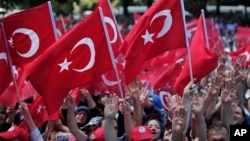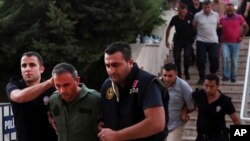Turkish lawmakers are expected to approve Thursday President Erdogan's call for a three-month state of emergency in a move that paves the way for further purging of his opponents after a coup attempt Friday failed to topple him and his government.
The state of emergency will be in place for a period of three months, Erdogan announced in a televised address late Wednesday night that followed marathon meetings, first with his national security council and later with his cabinet.
Erdogan said the state of emergency’s purpose is “to be able to take the most efficient steps to return to democracy and rule of law.” The Turkish leader said the armed forces would not take control of the country during this time.
For another night Wednesday, hundreds of Erdogan supporters filled Istanbul’s Taksim Square and other public venues across Turkey to show support for the Turkish leader and avert what the Turkish leader says could be a second coup attempt.
Erdogan’s statement was carried live on big screens set up around Taksim Square. The announcement of the state of emergency drew applause from the crowd.
Massive crackdown
The declaration allows Erdogan to expand an already massive crackdown that observers say primarily targets members of a spiritual movement led by Fethullah Gulen, a former imam who has been living in the United States for the past 17 years.
The total number of people detained since Friday reached more than 9,000, including 6,000 military, who are being held in what Erdogan describes as “pre-trial detention.” By some estimates, almost 50,000 public officials including judges and academics, were suspended or ordered to resign.
Turkish state media on Wednesday said the government has banned all academics from traveling out of Turkey. The reported order came after more than 21,000 employees of the Education Ministry, including more than 1,500 university deans, were suspended on Tuesday.
“The lynching has started,” said Beyza Ustun, an official of the Kurdish-dominated, left-wing People’s Democratic Party, reflecting concern that members of Turkey’s minorities have expressed at what they see as a growing threat to their rights.
Erdogan sees 'foreign hand'
Erdogan on Wednesday told al-Jazeera some of those who have been detained after the attempted coup have started confessing and providing what the Turkish leader said is information that links the coup attempt to Gulen. He said he believes a foreign power may have been involved, and said it would be a big mistake if the United States decides not to extradite Gulen, who lives in the U.S.
Erdogan has also said he will approve capital punishment if it is approved by parliament.
Erdogan, whose Justice and Development Party won a comfortable victory in elections last November, has hailed his defeat of the coup as a triumph of democracy. But his heavy-handed tactics, especially after the foiled putsch, have raised tensions with Washington.
While condemning the coup attempt, U.S. Secretary of State John Kerry said Washington wants to “make certain that as the response to the coup is implemented it fully respects that democracy that we are supporting."
In a telephone call Tuesday, U.S. President Barack Obama urged Erdogan to ensure the investigations and prosecution of the coup’s perpetrators are conducted in ways that reinforce public confidence in democratic institutions and the rule of law.
A White House statement said Obama made clear that the United States “is willing to provide appropriate assistance to Turkish authorities investigating the attempted coup.”


